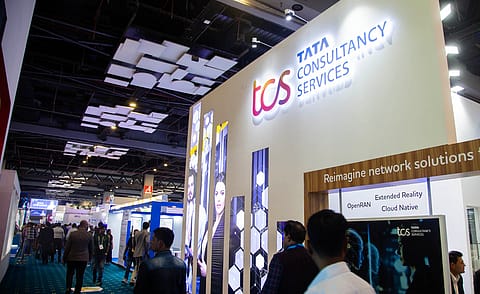Fortune India Explainer: What’s inside the AI pivot of TCS?
In a recent earnings call, the management of India’s largest tech company outlined the direction of its AI transformation. Here is all you need to know about TCS’s AI bet.

Starting 2025, TCS’s focus on AI has resulted in the creation of an AI and Services Transformation unit with the appointments of Janardhan Santhanam as Chief Information Officer (CIO) in July and Amit Kapur as Chief Al and Services Transformation Officer in September. The company is focussing on five key areas of investment in AI: driving an AI plus human model and AI-first culture within the organisation; building solutions at scale for connected intelligence; building an AI-ready talent base; developing innovative cross-industry solutions; and stepping up mergers and acquisitions to foray into new business ventures.
What’s the plan?
Under the ‘TCS to the Power of AI’ initiative, the company’s emphasis is on building a scaled agentic AI architecture, using AI responsibly, platform and partner innovation, and IP creation. To scale AI for its customers, TCS is looking to become an end-to-end AI solutions company from ideating to building and scaling with AI and is currently looking at building agentic AI for business value chains in each industry and enterprise functions across all its industry verticals.
What is its approach towards achieving a future-ready talent pool?
With talent being the biggest asset of an IT firm, TCS is creating personalised learning pathways using AI for its employees and working with academia to introduce the skills required for next-generation technology and human AI collaboration. With a focus on AI learning, the company now claims to have close to 150,000 employees with higher AI skills, including over 10,000 senior sales and delivery personnel who have undergone an immersive and hands-on AI dojo programme. TCS is also looking to acquire top talent from the industry for cutting-edge skills and capabilities, and to continue local hiring. “We have perfected this model in Latin America and the large local workforces in all key geographies, including the U.S., the U.K., and Europe, which we will continue to expand,” said K. Krithivasan, CEO & MD, TCS, during the earnings call.
How is TCS using AI internally? What are the gains?
Internally, TCS is using AI solutions in internal functions such as finance, human resources, legal, and IT operations, including how it supports as well as builds systems. In the HR function, it is using AI for employee engagement and rolling out a learning co-pilot for every employee. TCS said it is seeing a significant amount of benefit from AI in its software engineering lifecycle. “You start with single digits, then 10-15% productivity, then there’s an evolution to reach 20-25%, but that’s a journey to achieve a higher level of autonomy, and that’s what we are driving,” said Aarthi Subramanian, COO, TCS, in the earnings call.
Why is TCS building an AI data centre business?
In April, the company launched TCS SovereignSecure Cloud, a native Indian AI cloud infrastructure for government institutions, public sector enterprises, and regulated industries, compliant with the Digital Personal Data Protection Act of 2023. Now, TCS has set up a wholly owned subsidiary to enter the AI infrastructure space, and it will set up a data centre with a capacity of up to 1 GW. TCS expects to achieve 1GW over a period of 5-7 years, with every 150 MW costing the company about $1 billion, which will be financed through a combination of equity and debt. TCS plans to bring in finance partners for equity. The prospective customer base the company is looking to sell its data centre services to include pure-play AI providers, deep tech companies, hyper-scalers, fulfil government needs in India, and PSUs. Revenues from this division are expected to start showing up in about 18-24 months. In partnership with IBM and the Government of Andhra Pradesh, TCS is looking to deploy India’s largest quantum computer in the Quantum Valley Tech Park. The company hopes to ride the enormous data centre demand in the coming days and sees this as a guaranteed stable annuity revenue stream.
How do analysts view TCS’s AI adjacent play?
According to analysts at InCred Equities, the new sovereign artificial intelligence (AI) data centre business is likely to bring in additional ₹1,800-2,250 crore of incremental revenue per 150 MW annually at full capacity and potential RoE dilution. On the other hand, Motilal Oswal Equity Research sees this as a cash deployment strategy rather than a services-led growth driver. However, the integration of AI infrastructure with mainstream IT services remains unclear. “We have maintained our estimates for FY26/27/28, as we do not forecast revenue or investments from the data centre business until we get further clarity,” said a note dated October 10.
